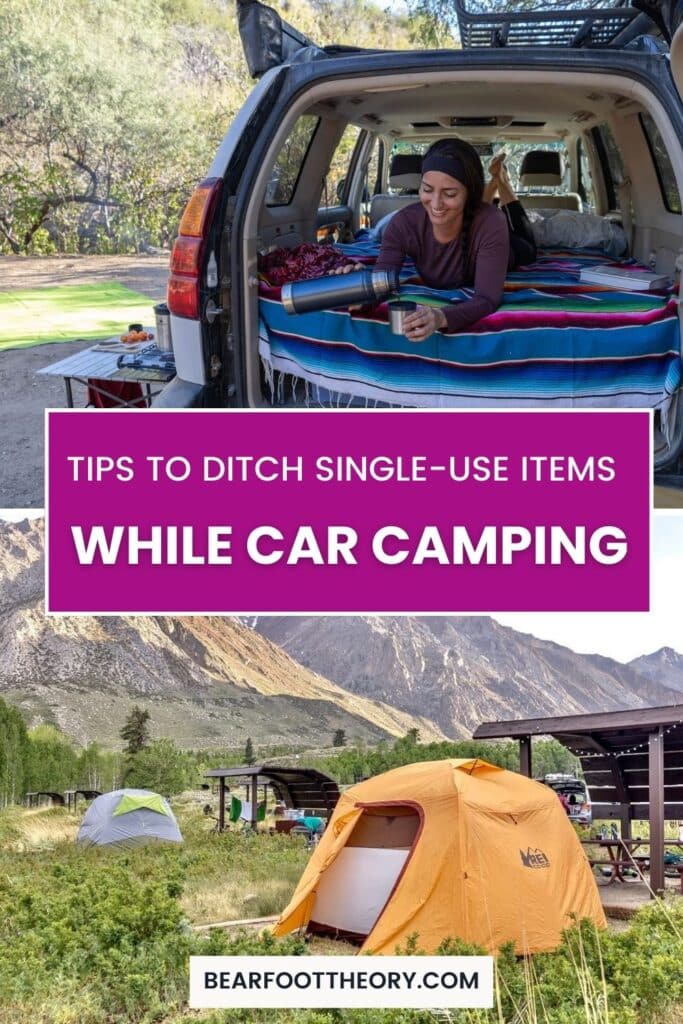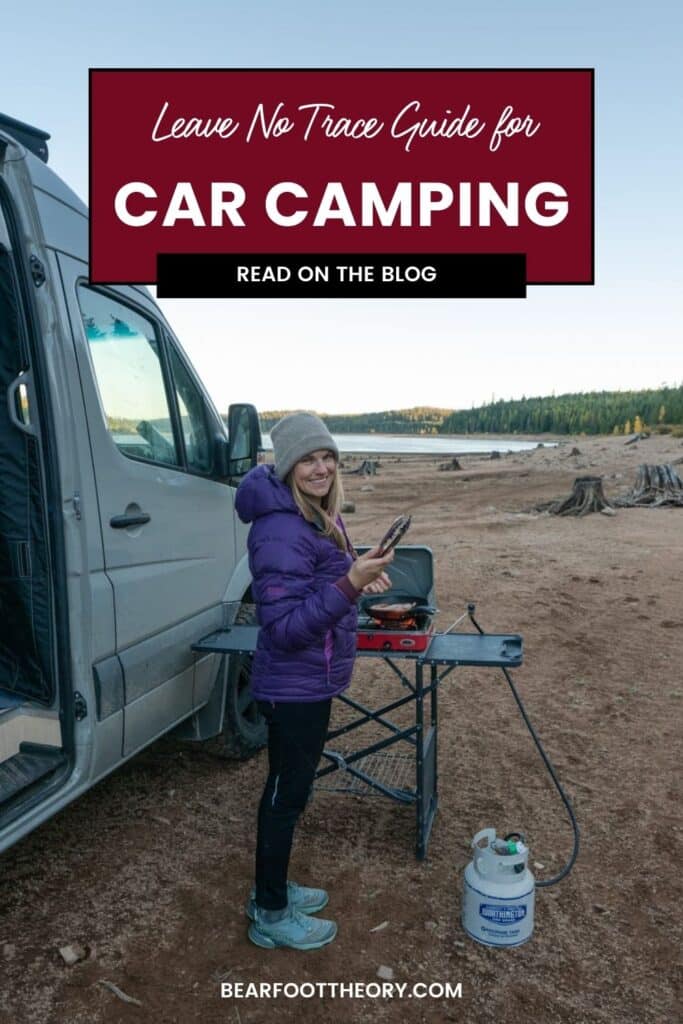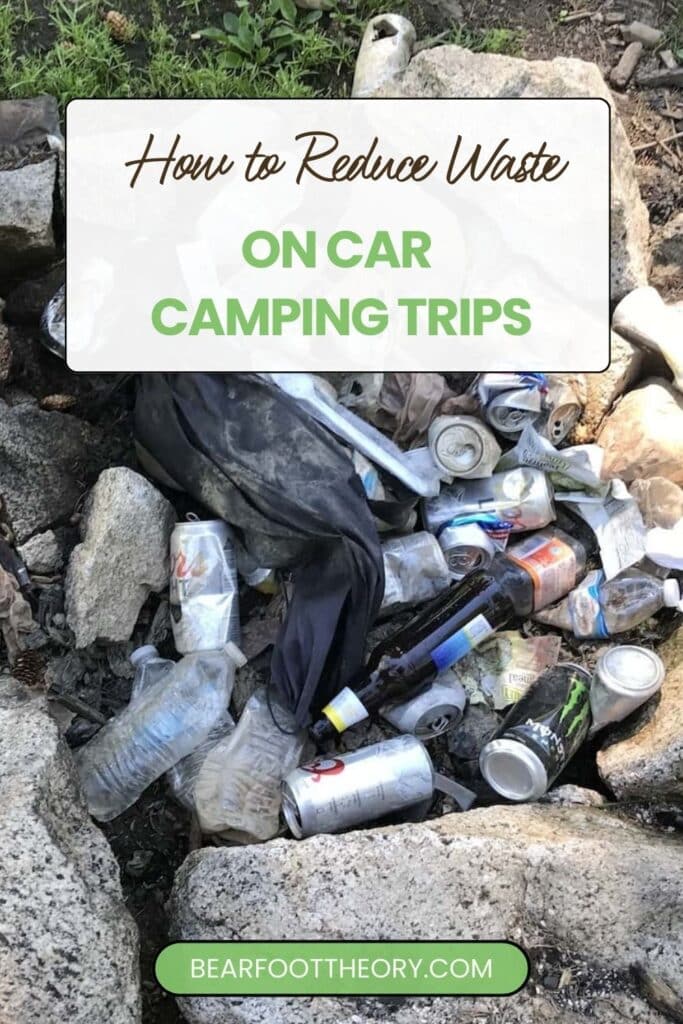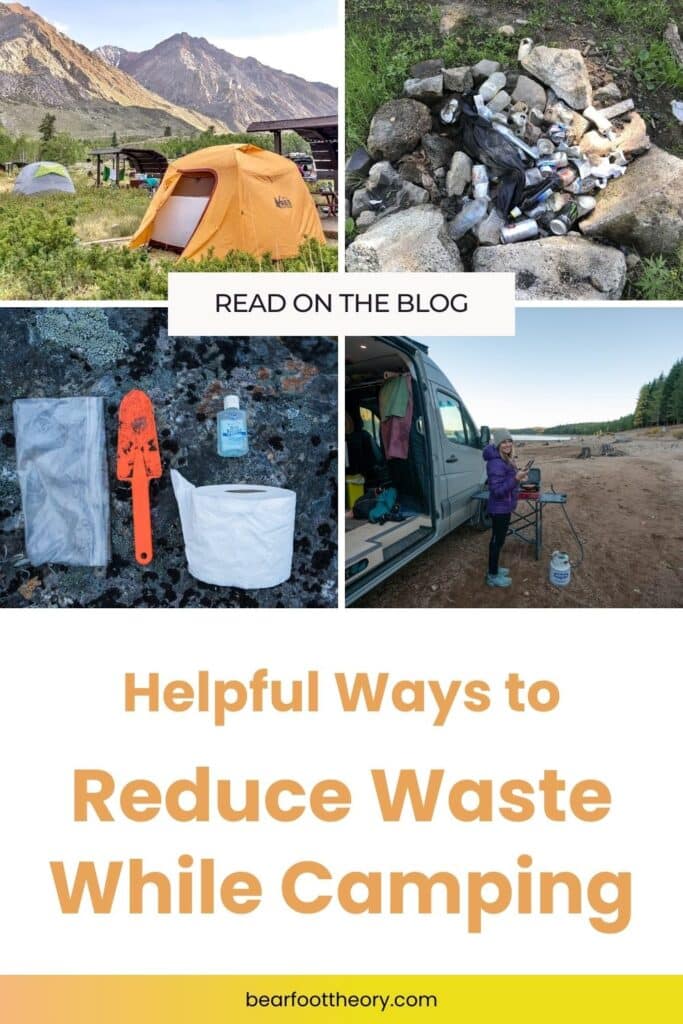How to Reduce Waste on Car Camping Trips
To avoid using disposables while camping, here are my tips on how to reduce waste and plastic use on camping trips and adventures.
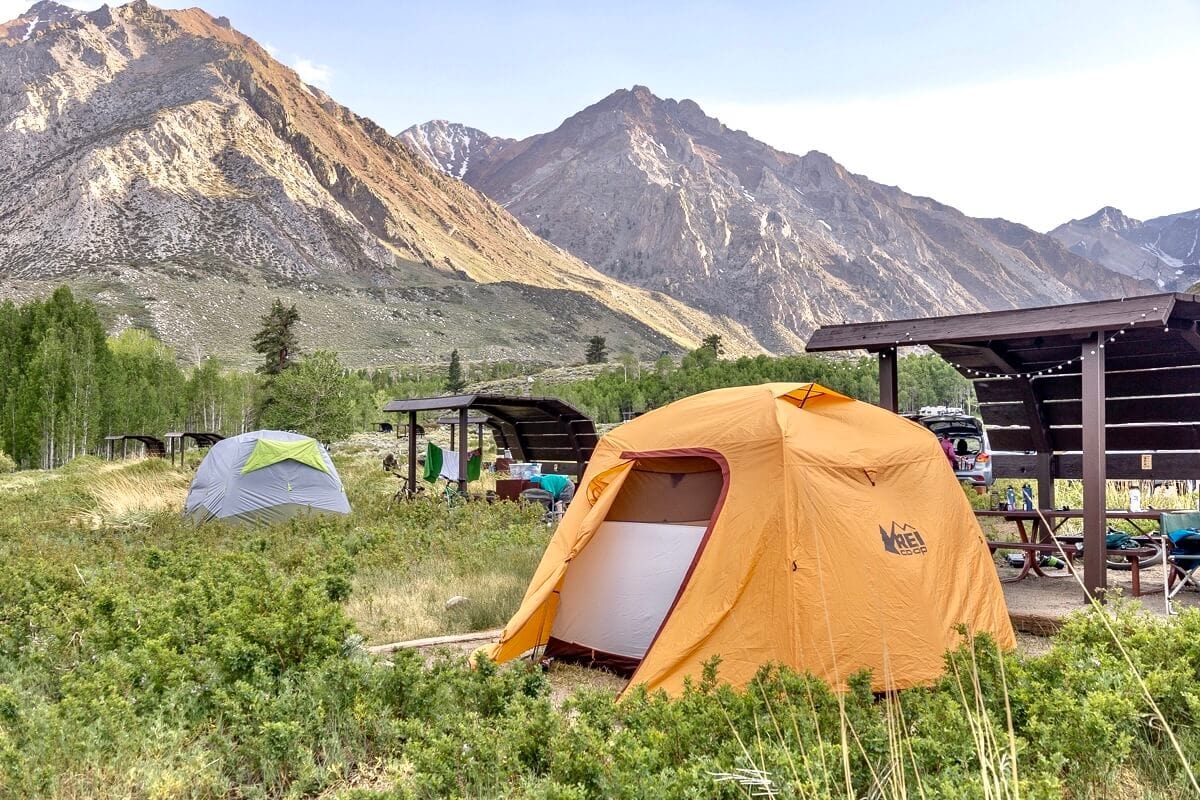
Many car campers and backpackers depart a campsite with a trash bag or two full of waste. Even if you make your best effort at home to reduce your environmental impact, it’s easy to let those good habits slide on a car camping trip.
Or, how many times have you driven to a campsite and found the garbage bin overflowing with trash, or even worse, found entire garbage bags of trash dumped by the bathrooms?
I’m always looking for ways to recreate more responsibly, reduce my environmental impact, and Leave No Trace on my adventures. Reducing waste while camping, whether in a tent or camper van (and really in my everyday life), is a big one.
Whether it’s disposable utensils, plastic bottled drinks, or excess packaging, there’s probably more in our trash bags than there needs to be (I’m guilty too!). Here are a few tips I follow to try to reduce the amount of waste I produce on my camping trips.
This post may contain affiliate links.
Ditch Single-Use Disposables
The main culprit of unnecessary waste while camping is in my camp kitchen. Things such as disposable plastic utensils, Solo cups, Ziploc baggies, paper plates, plastic water bottles, and food items packaged in plastic add up over time.
So before I head out, I always take stock of my camp kitchen essentials to see if there’s any room for improvement, then put together a bin of reusable supplies to reduce waste while camping.
Here are a few of my favorite reusable camp kitchen items:
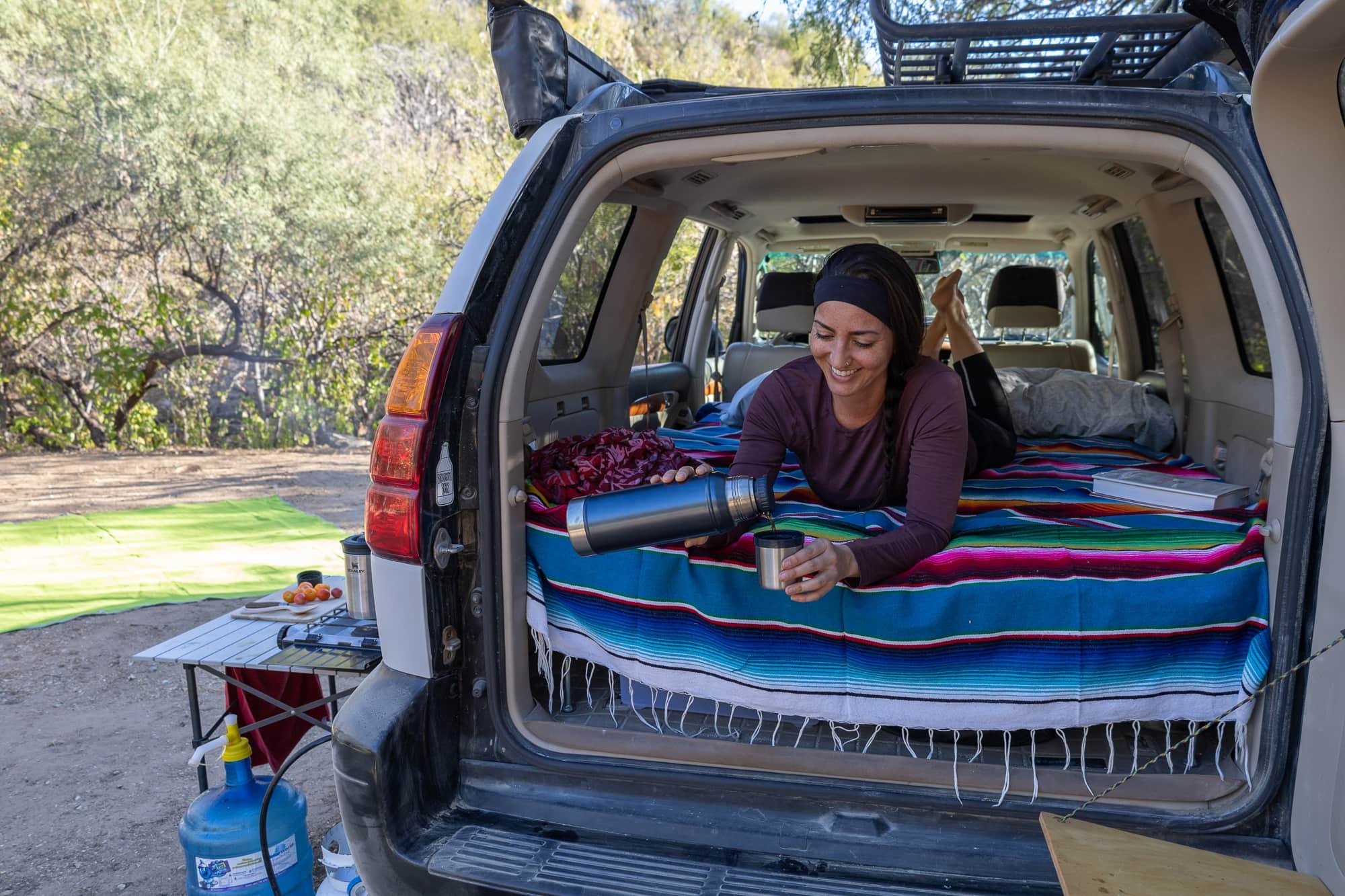
Save this post!
Enter your email & I'll send this post to your inbox! You'll also receive my weekly newsletter full of helpful advice for planning your adventures.
Prep and Pack Food From Home
I like to grab my reusable food containers and pack my cooler full of fresh or pre-prepped food from home to reduce waste while camping. From homemade sandwiches and wraps to batch-cooking granola, trail mix, or other energy-boosting snacks, there are many ways to avoid the pre-packaged foods on the market.
While zero-waste camping is ultimately the end goal, I know it’s not an easy transition. Here are some of my favorite camp foods that typically don’t come wrapped in plastic and are easy to prep or make ahead of time:
If you’re a backpacker trying to keep it lightweight and handy, those grab-n-go bars and dehydrated backpacking meals might be your best bet. For car campers who need to feed a crowd, it might be hard to avoid store-bought items altogether, so do what you can and build on it as you go.
As always, the most important thing is to pack out and properly dispose of whatever waste you create, no matter how small.
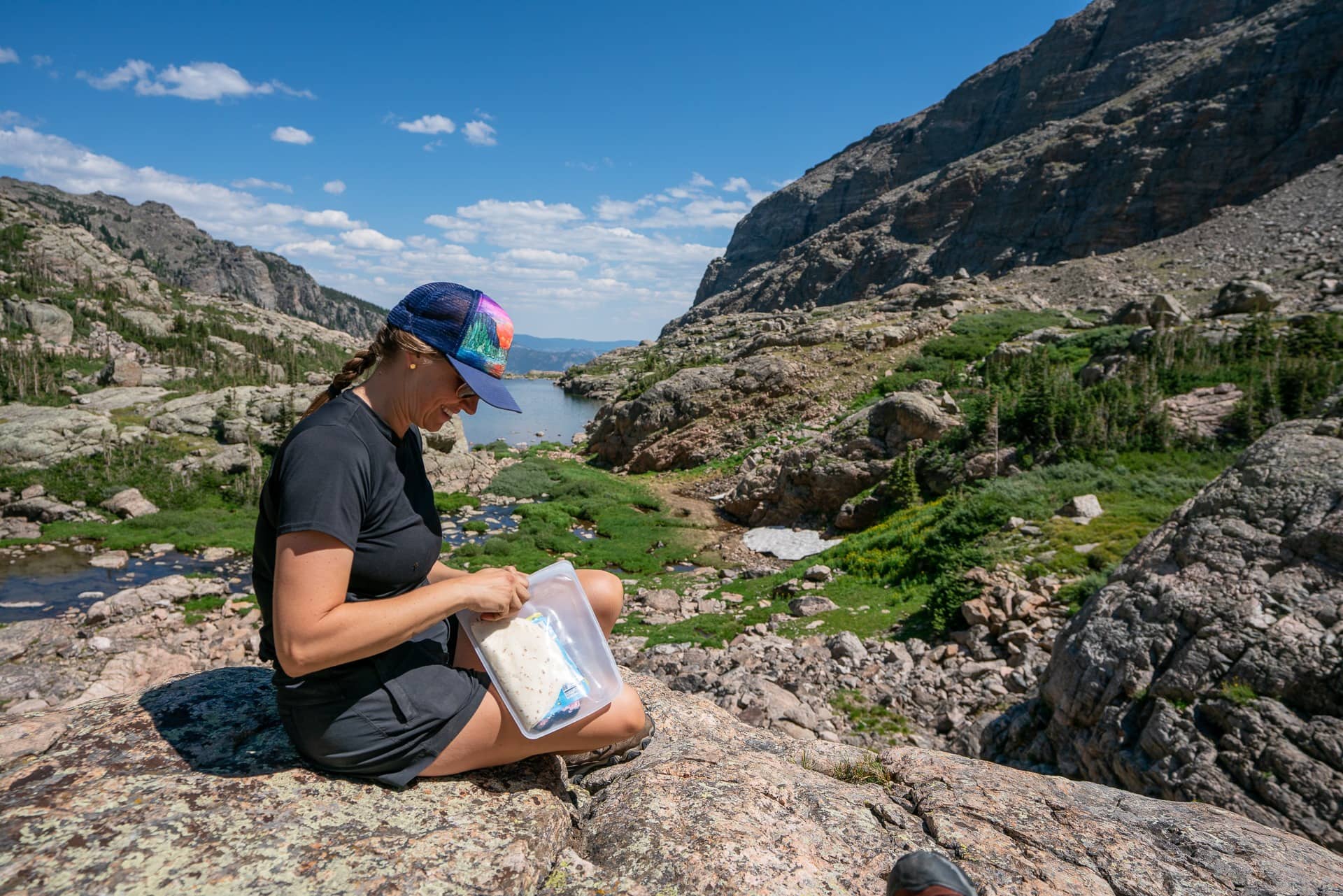
Eliminate Single-Use Plastic Water Bottles
Using plastic water bottles is one of the quickest ways to accrue unnecessary waste while camping — not to mention in our everyday lives. With so many reusable water bottle options nowadays, there is absolutely no need for this – it’s time to kick the plastic water bottle habit for good.
Plastics are polluting oceans and waterways. Plastic water bottles also take up a ton of space and simply aren’t a good idea – no matter how convenient they might seem.
Use a large reusable water bottle instead (Hydro Flask is my favorite) or a hydration pack in your hiking backpack as an easy, efficient alternative for zero-waste camping. If you’re packing for a group, bring a bigger water container – like this 5-gallon jug – that you can refill at camp. Many National Parks and State Parks have potable drinking water refill stations, but you should always check ahead of time.
Another option for car campers staying for a long period with a water source nearby is to use a water filter. Collecting and safely filtering your own water is an especially great option for saving some room during a multi-day trip.
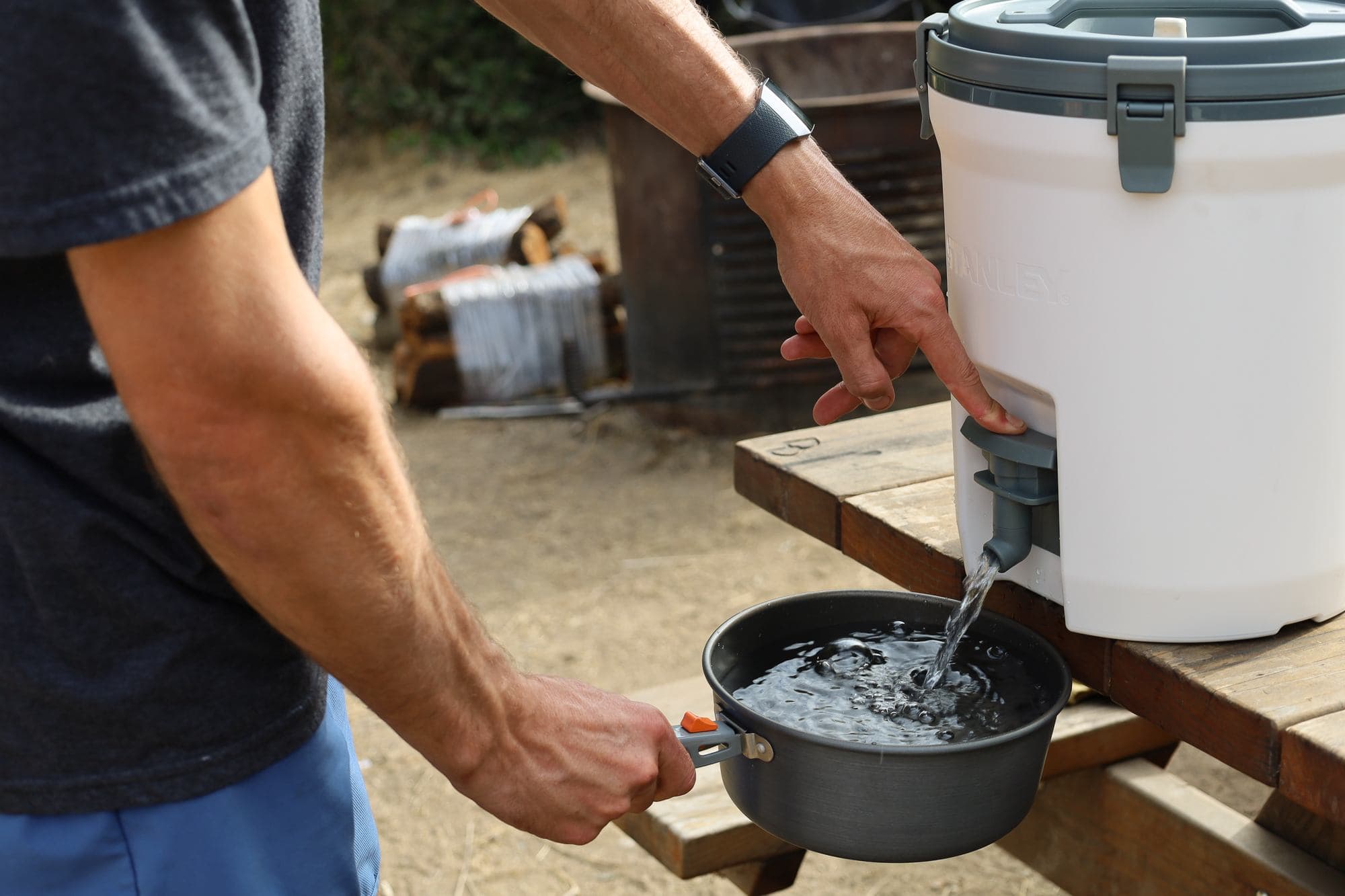
Don’t Buy Miniature Toiletries
It’s tempting and easy to toss a few small, disposable toiletries in your car before an epic weekend of peak-bagging. However, since you are not limited to travel-sized 3oz liquids like you are for carry-on air travel, why not just pack your normal toiletries for your car camping adventure?
If space is an issue, buy reusable containers as a permanent replacement and simply refill as needed – that way you purchase them once and you’re set. I love these goToob+ containers, and Nalgene even makes small reusable containers in varying sizes for toiletries.
Multi-purpose, organic, biodegradable products like Dr. Bronner’s soap can work wonders for cleaning your hands, face, and dishes! Thinking outside the box is key when it comes to zero-waste camping, and you might just be surprised by what you come up with.
Use a Refillable Propane Tank
According to the California Product Stewardship Council, 40 million disposable propane cylinders are used annually – now that’s a lot of waste. Individual propane cylinders are expensive to recycle (when they’re recycled), but many are improperly disposed of and end up in landfills.
Refillable propane tanks are an easy answer that reduces waste while car camping, helps the environment, and saves you money to boot. You can buy refillable 1lb propane bottles (the same size as the typical ones available at outdoor stores). If you camp often or travel in a camper van, you may want to buy a larger 5, 10, or 20-lb cylinder so you can go much longer without having to refill.
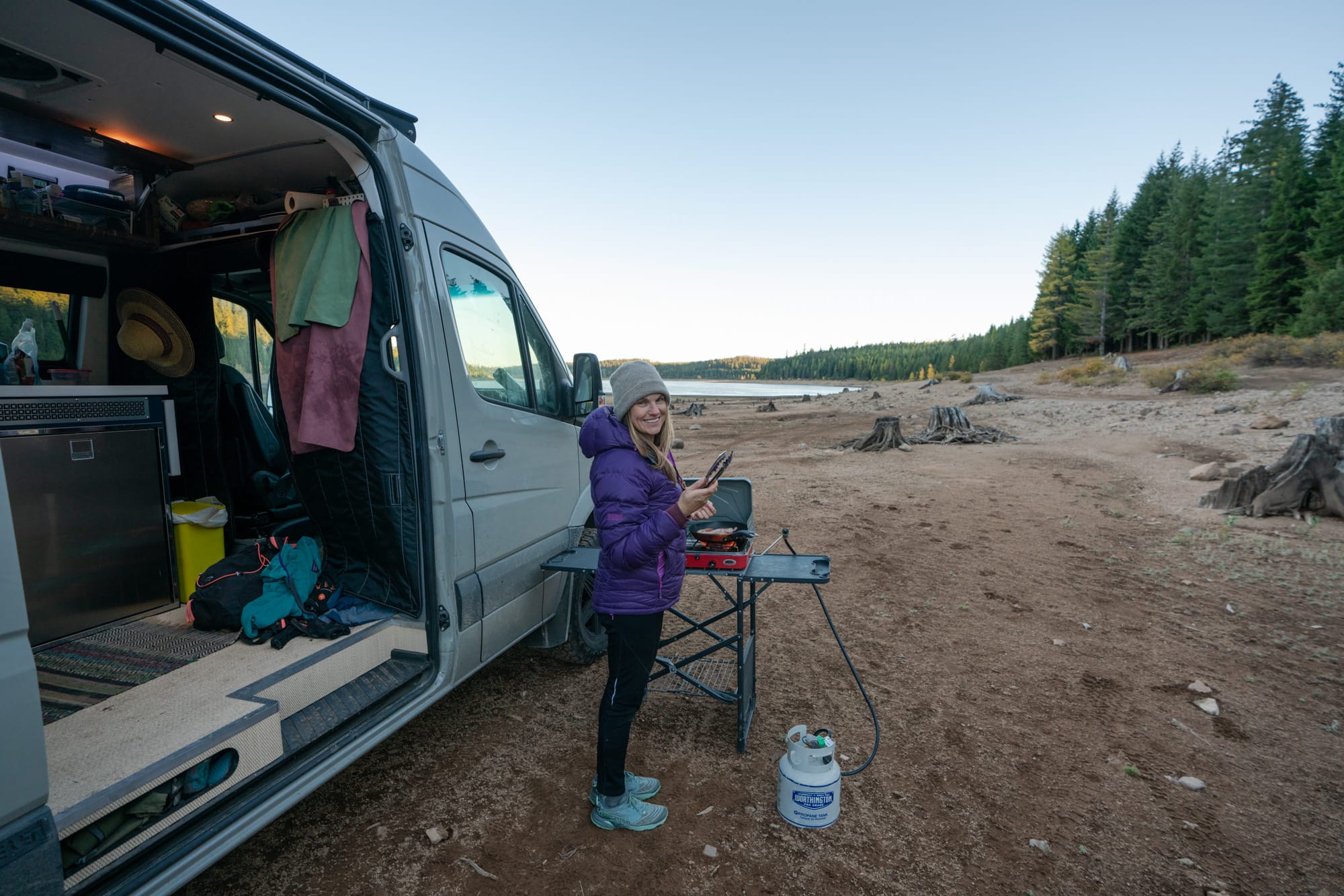
Use Rechargeable Devices
Buying batteries for your flashlights, headlamps, lanterns, and speakers is unnecessary now that there are rechargeable options out there. One-time-use batteries have to be disposed of properly at specific hazardous waste drop-off sites – in fact, it’s illegal to throw single-use batteries in the trash in California.
When you’re in the market for a new headlamp, lantern, or speaker, purchase one with a rechargeable battery, and opt for an energy-efficient LED option that will last longer.
Here are some of my favorite rechargeable products for camping on the more eco-friendly side:
Leave No Trace (and Leave It Better Than Before)
After hours of driving, you finally pull up to a campsite that you reserved online months ago, expecting to see nothing but a clean and pristine area — only to find a pile of trash and a few empty beer cans strewed around the fire ring. It’s disappointing and no one wants to arrive at that sort of scene, let alone have to pick up another camper’s garbage, but it happens.
To avoid this scenario, remember to always follow the Leave No Trace principles by packing out every last item and piece of trash that you brought with you. This includes things like used toilet paper, tissues, and any broken or unwanted gear. Bonus points if you pick up other trash you find at the campsite that isn’t yours!
No matter if you are well-versed in how to Leave No Trace and practice it regularly, here’s something else to consider: learn how to make a campfire that leaves no trace. Small things like burning your trash, recyclables and leftover food may seem harmless but they have a bigger impact on the environment than we might realize.
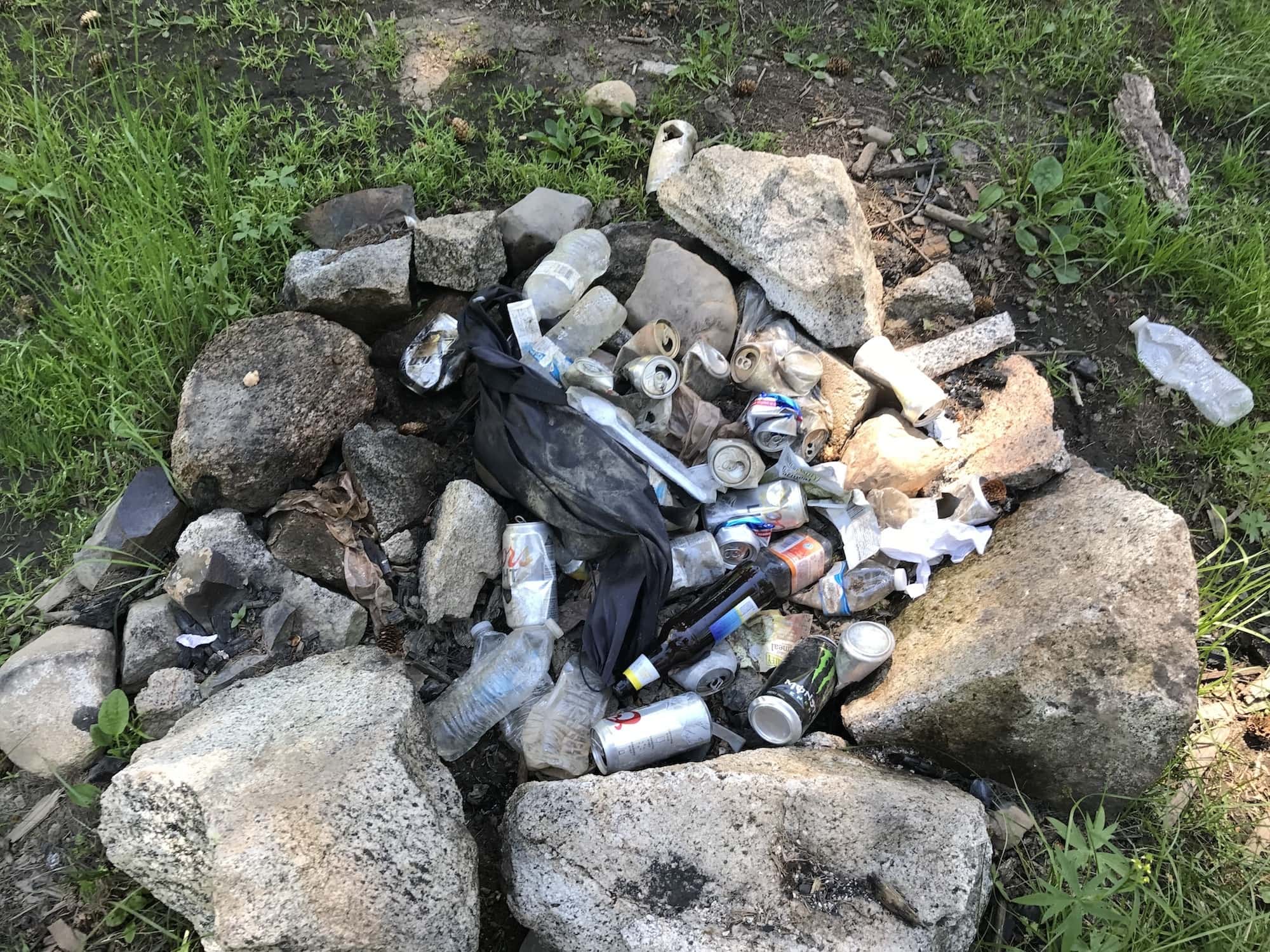
Use Bathroom Facilities & Know How to Poop Outdoors
It’s worth noting that you should always use bathroom facilities if they’re available to reduce impacts on your campsite and the surrounding areas. I’ve been to campsites that smell like pee, and I’ve even encountered human waste and used toilet paper in bushes which is SO not ok.
If there are no bathroom facilities where you’re camping, bring a portable, folding toilet or dig a hole 6-9″ deep at least 200 ft away from water sources, trails, and campsites, do your business, bury it with dirt, and dispose of your used toilet paper in the trash or pack it out with your garbage. Check out the complete guide to pooping outdoors for more on this topic.
One thing to note is that the method of pooping outdoors outlined above is not ok everywhere. Some areas are particularly sensitive, such as desert environments and narrow river canyons, and require that human waste is packed out in wag bags if no bathroom facilities are available.
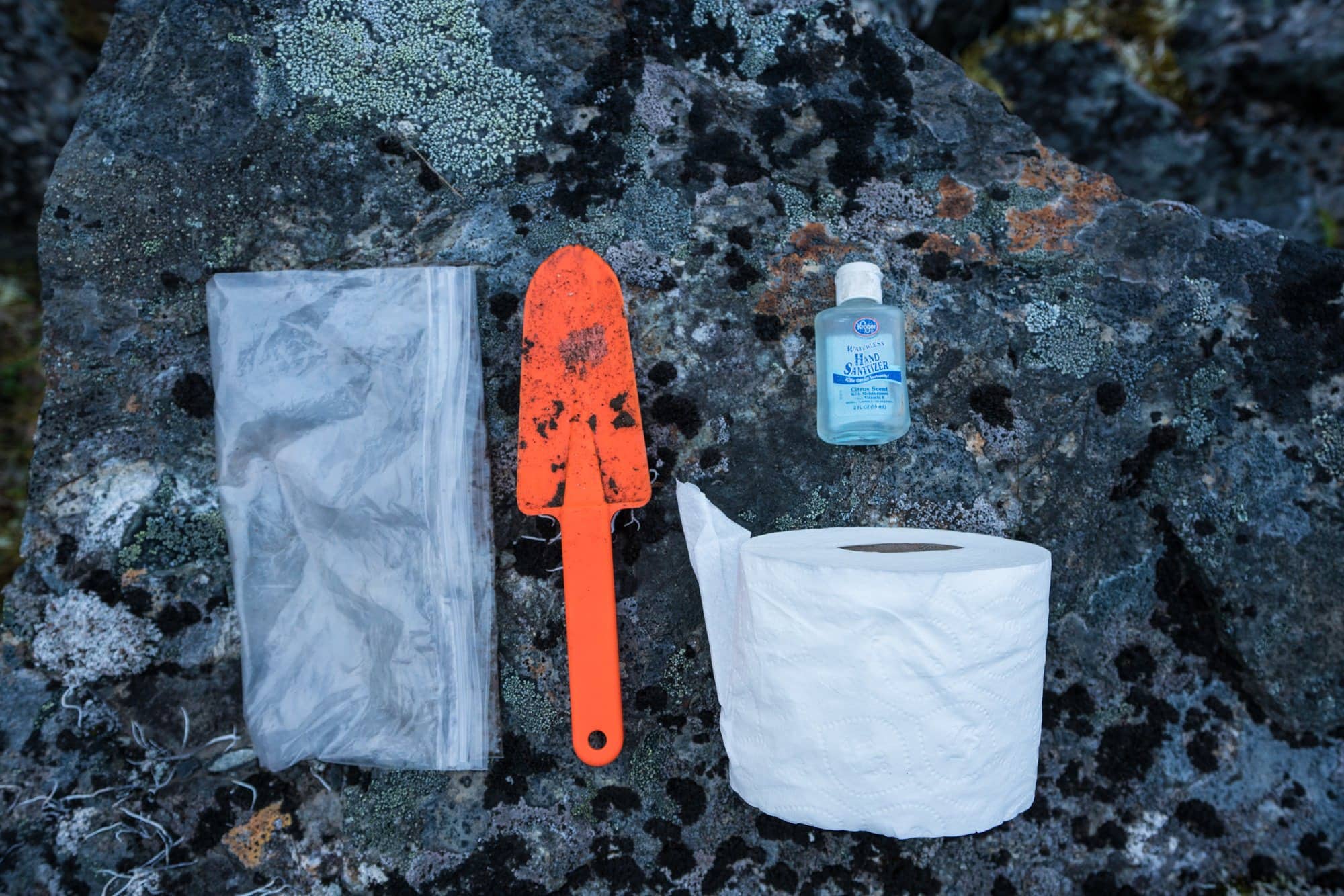
Separate Your Recycling & Compost
Bring an extra box or dedicate a trash bag just for your recycling while car camping. This is an easy way to divert some of your car camping waste from landfill to recycling!
Did you know that although 75% of all waste is recyclable, only about 30% ends up being properly recycled? Properly separating your waste while car camping can have a big impact!
Some campgrounds have separate bins for recycling. If not, I take my recycling home with me so I can recycle it properly. I put it in a separate trash bag or bin – it’s a cinch!
If you compost at home, why not pack a small seal-tight container for your food scraps? They’ll be fine in a bin for a couple of days, and if it seals tight, you won’t smell a thing.
If you don’t compost at home, check out ShareWaste for finding hosts to drop off your compost while on the road. Food waste is the #1 item that ends up in landfills, so composting can have a huge positive impact!
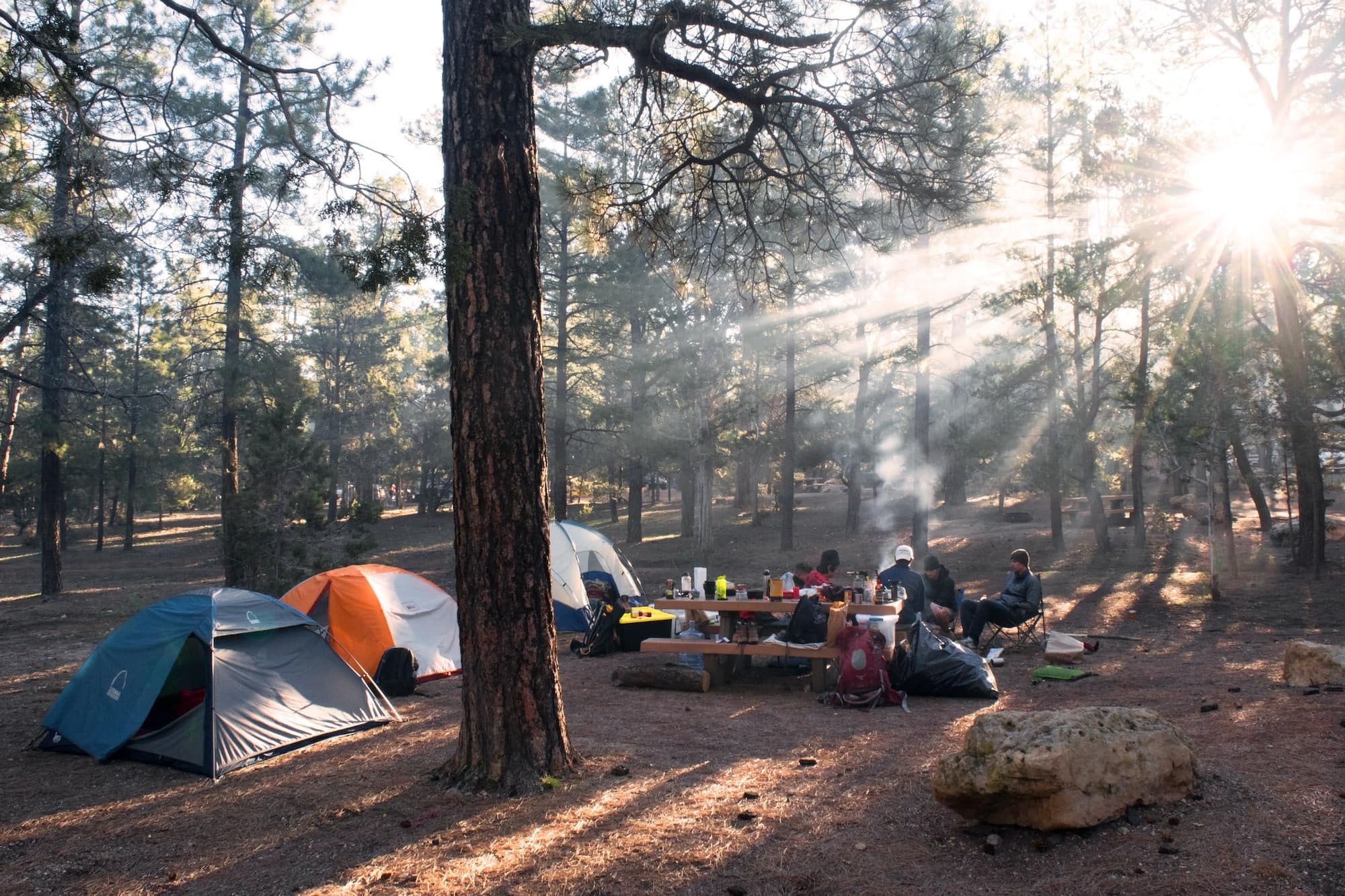
Reuse Bags & Containers for Trash
While I always bring a trash bag along on my camping trips so I’m prepared to pack out my trash, I first try to reuse the bags I already have. This is a convenient way to reduce my use of plastic.
The ziplock bag my tortillas came in makes a perfect receptacle for used tissues or TP. The plastic bag my burger buns came in can serve as a mini trash bag, too.
Reuse whatever materials you can to reduce waste while car camping.
Frequently Asked Questions
My biggest tip to reduce food waste while camping is to only bring what you know you’ll eat. In order to do this, I take time before my trip to plan my meals and portions so I know exactly which ingredients and how many items I’ll need to pack. If I end up with leftovers, I share them with other campers or stick them in my cooler to eat once I get back home. I also try to cook camp meals that utilize the same ingredients to repurpose them.
To reduce the environmental impact of your toiletries, use eco-friendly and biodegradable products. If I’m only camping for a night or two, I’ll often forego a shower altogether and use body wipes. If I need a shower, I use solid shampoo bars and soap to reduce plastic waste. I like to use toothpaste tablets (which are better for the environment) and make sure to dispose of my used water at least 200 feet from natural water sources.
It’s tempting to reach for paper plates and napkins when packing for a camping trip because you’ll have fewer dishes and laundry to do. However, investing in a set of reusable camping plates and cloth napkins can help cut back on paper waste from single-use products. I also try to cut back on using toilet paper when possible by using a reusable pee cloth (like a Kula Cloth).
More Car Camping Tips
Save this post to Pinterest
How do you reduce waste on car camping trips? What areas are hardest to tackle? Share your sustainable camping tips, comments, and questions below!

